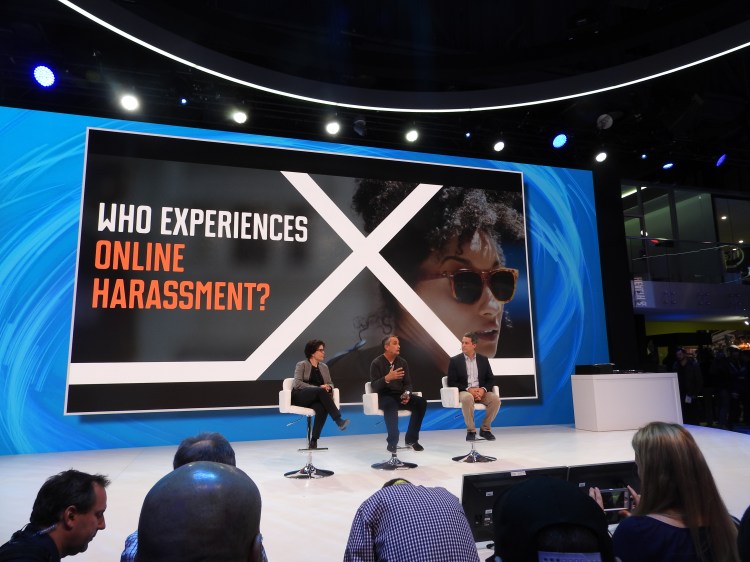Intel CEO Brian Krzanich said today at tech’s biggest North American trade show that online harassment is frighteningly real and announced a new alliance of tech leaders banding together to fight it.
On Monday, Krzanich announced the new Hack Harassment initiative to combat online harassment — a problem that he said “affects all of us” — during his keynote speech at the opening of the 2016 International CES, the big tech trade show in Las Vegas.
Intel is teaming up with Vox Media, Re/code, and Lady Gaga’s Born This Way Foundation to fight online harassment, which has become the topic of a heated (online, of course) debate in the game and tech industries. “We are excited to be part of a process that will create more empathy online,” said Jim Bankoff, CEO of Vox Media. “We all have a vested interest in this.”
Kara Swisher, cofounder of Re/Code, said online harassment has real emotional repercussions and that it’s time to do something about it. Swisher said that as the editor of Re/Code, she will deal with the issue at Re/Code’s annual conference.
“We’re not going to shut up,” she said. “We’re not going to stop until they stop hate speech. People believe in free speech. They do not believe in hate speech.”
“It’s a serious issue and a personal issue that we can do something about,” Krzanich said at a press conference about the anti-online harassment group on Thursday. “If we are going to have a world that is more and more connected, you have to remember behind all those postings and comments, there is a person.”
He said harassment can occur via forums, comments, gaming, chat, and other forms of online communication. He cited the Pew Research Center as saying that 40 percent of users have personally experienced harassment and 73 percent have witnessed someone being harassed. One in four have seen someone physically threatened online, and one in five have witnessed someone being sexually harassed or stalked online.
“These add up to tens of millions of people,” he said. He also pointed out that “from a standpoint of diversity, it’s more important that we talk about it.”
More than half of African-American and Hispanic users said they have been harassed online, while a third of whites said they had experienced harassment. Seventy percent of 18-to-24-year-old women and men said they have been harassed. Women are three to four times more likely to be stalked or harassed than men.
“For someone who has two daughters, this is very real,” Krzanich said. “I have personally experienced harassment. I have a friend who has been stalked online … and it is truly affecting her.”
Just how concerned is the tech industry about harassment? Seventy-five percent of tech professionals are concerned about online harassment and 80 percent think there is real-life risk of emotional impact for the person being harassed.
Some harassers may defend their speech by saying they were joking or are just speaking their minds. But the panelists said there are lines that people can cross where free speech turns into hate speech.
As with pornography (where a Supreme Court justice said it was hard to define, but you know it when you see it), you know what online harassment is when you see it, Krzanich said.
“The last refuge of a bully is ‘It was a joke,'” Swisher said. “When you threaten a woman with rape in a restaurant,” there will be repercussions. You may be thrown out of the place, she said. “But online, there are no repercussions.”
The alliance will be hosting a series of hackathons to look into technological solutions to the problem.
Seventy-five percent of tech professionals believe a “universal code of online conduct” would help curb harassment. Fifty-one percent believe that blocking Internet Protocol addresses of known harassers would be very effective, and 47 percent recommend building more tools into sites that allow users to block or report content.
Harassment on some forms of media (such as livestreams on platforms like Periscope) could be dealt with through artificial intelligence in real time, Krzanich said.
Online harassment is just one issue that Intel’s CEO is taking on.
To address diversity concerns in the tech industry, Intel said last year that it would set up a $125 million fund to invest in companies owned by women and underrepresented minorities — defined as African-Americans, Latinos, and Native Americans.
Krzanich announced this week that Intel’s new hires in the past year were 43 percent women and underrepresented minorities. On top of that, he added, retention of women and underrepresented minorities is on par with that of non-diverse employees.
These new announcements are a follow-up to Krzanich’s promise at last year’s CES that Intel would invest more than $300 million to diversify the talent represented in the technology industry. It is a huge commitment that dwarfs other efforts to change the face of Silicon Valley.


